Addressing climate change impacts on economic growth in Cambodia
Cambodia is highly vulnerable to climate change (CC). Rising temperatures are expected to reduce productivity in agriculture, fisheries and forests and to reduce labour productivity across most sectors. Changing rainfall patterns will lead to increased flooding, drought and storms which will also reduce resource productivity, especially in agriculture and fisheries, and increase damage from extreme events, affecting roads, water supply and other infrastructure. Rising sea levels will cause flooding and storm damage in coastal areas, affecting urban areas and natural resources.
The government response to CC includes a CC Strategic Plan (CCCSP), sectoral Climate Change Action Plans (CCAP), both in 2013, and the Nationally Determined Contribution (NDC) to the Paris Climate Agreement, in 2015. These define a range of priorities that cover most of the sectors affected by CC.
Cambodia has played a leading international role in responding to CC, being one of the first countries to conduct a Climate Public Expenditure and Institutional Review (CPEIR) and a CC Financing Framework (CCFF) and conducting an active programme to build capacity in CC Cost- Benefit Analysis. The Ministry of Economy and Finance (MEF) is now taking a further step by being the first country to develop and apply a Climate Economic Growth Impact Model (CEGIM), with support from the National Council for Sustainable Development (NCSD).
Explore further
